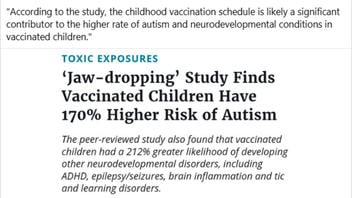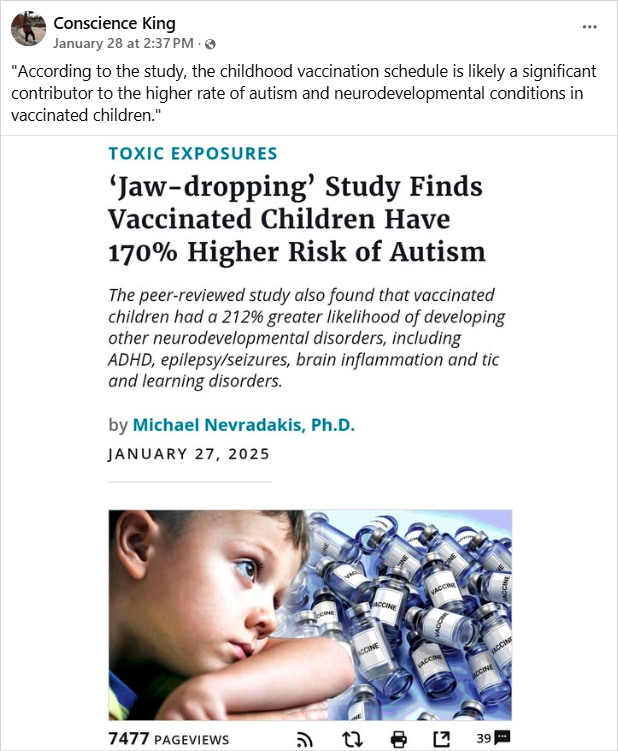
Is a study that claims vaccinated children have a 170 percent higher risk of autism reliable? No, that's not true: An infectious disease expert told Lead Stories the study is "just junk," saying the journal it was published in and the study design both lack credibility. Numerous large studies have found no proven link between vaccines and autism.
The claim appeared in a post (archived here) on Facebook on January 28, 2025. The title of its screenshot is "'Jaw-dropping' Study Finds Vaccinated Children Have 170% Higher Risk of Autism." The post's caption said:
According to the study, the childhood vaccination schedule is likely a significant contributor to the higher rate of autism and neurodevelopmental conditions in vaccinated children.
This is what the post looked like on Facebook at the time of writing:
(Source: Facebook screenshot taken on Tue Feb 4 16:36:23 2025 UTC)
The post includes a screenshot of an article (archived here) from The Defender, a publication of Children's Health Defense, an organization started by Robert F. Kennedy Jr. that's known for advocating that parents not have their children vaccinated.
This post itself did not provide any evidence to support the assertion that the study found a 170 percent higher risk of autism (Autism Spectrum Disorder, or ASD) in vaccinated children.
The study
The study (archived here) cited in The Defender article, "Vaccination and Neurodevelopmental Disorders: A Study of Nine-Year-Old Children Enrolled in Medicaid," was published on January 23, 2025, in Science, Public Health Policy and the Law.
The findings in the "Discussion" section of the study mirror the headline in "The Defender" article:
Increasing numbers of vaccinations were associated with significantly increased risks of ASD. Children with just one vaccination visit were 1.7 times [170 percent] more likely to have been diagnosed with ASD than the unvaccinated, whereas those with 11 or more visits were 4.4 times more likely to have been diagnosed with ASD than those with no visit. The increasing risk of ASD associated with numbers of visits for vaccinations suggests that some component or components of vaccines have progressively adverse effects.
The study's lead author, Anthony R. Mawson, did not respond to Lead Stories' email about its findings.
Expert
While the headline matches the study's results, a health expert, autism nonprofits and public health agencies told Lead Stories the findings are not reliable.
Dr. James Lawler, an infectious disease expert at the University of Nebraska Medical Center, told Lead Stories in a February 5, 2025, email that the study has several strikes against it. He explained:
Science Public Health Policy and the Law - not a real scientific journal. Not indexed by the National Library of Medicine as a true peer-reviewed scientific journal. And if one looks at the contents, it is an endless screed of anti-vaccine propaganda. ...
Study design - such a retrospective cohort design cannot control for all sorts of biases, including access to health care. Kids who were not vaccinated as part of this cohort of Medicaid (the poorest in communities) may have been unvaccinated by choice, but many likely had inadequate access to healthcare and medical documentation. If vaccines or documentation were unaccessible to them, what are the odds that they would be able to get adequate medical follow-up to diagnose a developmental disorder.
The above study design concerns assume the authors made an effort to accurately report the data they analyzed, which would be out of character for the place of publication.
A retrospective cohort study looks at past data to find links between an exposure (like vaccines) and an outcome (like autism). Researchers compare groups based on past exposure and track their outcomes.
This type of study can have flaws, like missing data or hidden biases, making it less reliable than experiments.
Autism organizations
Autism Speaks
The website (archived here) for Autism Speaks, a nonprofit that supports people with autism and their families, says vaccines do not cause autism (emphasis theirs):
There is no connection between vaccines and autism. Autism is often diagnosed around the same time children receive routine vaccinations, which has led to concerns about a connection--but decades of scientific research have confirmed that vaccines do not cause autism.
Autism Science Foundation
The Autism Science Foundation (archived here), a U.K. nonprofit organization that also funds autism research and supports families affected by autism, came to the same conclusion (emphasis theirs):
Vaccines Do Not Cause Autism
There is no correlation between autism and vaccines. This has been confirmed through dozens of scientific studies examining different types of vaccines and different vaccine timing schedules. Researchers have also studied thimerosal, a mercury-based preservative used in many vaccines, to see if it had any relation to autism. The results are clear: The data show no relationship between vaccines, thimerosal and autism.
Public health
Centers for Disease Control and Prevention
The Centers for Disease Control and Prevention (CDC) (archived here) says there's no link between the shots and ASD:
Scientific studies and reviews continue to show no relationship between vaccines and autism.
The CDC website (archived here) has more information on "Autism and Vaccines."
Food and Drug Administration
The Food and Drug Administration (FDA) is the agency responsible for making sure vaccines used in the United States are safe, effective and high quality. An FDA spokesperson shared this response with Lead Stories in a December 6, 2024, email for a different story about vaccine safety:
All vaccines for children and adults that are licensed in the United States are supported by well-controlled clinical trials that have established their safety and effectiveness, and the FDA continues to monitor their safety using different surveillance systems after they are marketed. In addition, the FDA helps to ensure that vaccines are produced with high quality in inspected facilities that meet rigorous standards.
All U.S. FDA-approved and authorized vaccines have undergone the FDA's thorough review process and have met the agency's rigorous standards for safety, effectiveness, and quality. It should be noted that vaccines are one of the most highly effective public health interventions, responsible for saving millions of lives each year.
The FDA's "Vaccine Development - 101" page (archived here) says the following about the process:
Vaccines to prevent infectious diseases are given to millions of babies, children, adolescents and adults and it is critical that they are demonstrated to be safe and effective. Vaccines have prevented countless cases of disease and disability and have saved millions of lives. Ensuring the safety and effectiveness of vaccines is one of FDA's top priorities.
FDA's Center for Biologics Evaluation and Research (CBER) ensures that FDA's rigorous scientific and regulatory processes are followed by those who pursue the development of vaccines. Vaccine development is a complex science. FDA's scientific and regulatory advice to vaccine developers, as well as FDA's evaluation to determine the safety and effectiveness of vaccines, are among the most robust in the world.
In the conclusion of his email to Lead Stories, Lawler had these final words on the study's claim that vaccinated children had a 170 percent higher autism risk. He said:
Bottom line - it is not even junk science. It is just junk. Many, many legitimate and comprehensive epidemiological studies have demonstrated that there is no identifiable link between vaccines and autism.
Read more
Additional Lead Stories fact checks of claims about vaccines can be found here.
Other Lead Stories fact checks of claims involving Robert F. Kennedy Jr. can be found here.


















